

Frequency adverbs: position in sentence. Conditionals infographic. Passive voice. Simon's Cat TV dinner - Present perfect. 1) Order the words.
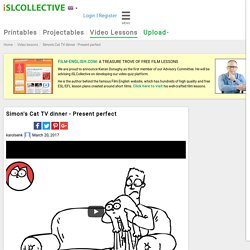
Put the words in order:hasjustsatSimondown. Irregular verb list & audio. Use the list below to learn all your irregular verbs!
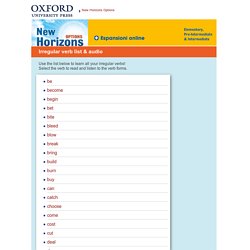
Select the verb to read and listen to the verb forms. For and since. Past Simple and Christmas. 1) What did Mrs.

Claus give to Santa Claus? Hot tea, chips and pickle hot tree, cheese and pineapple hot tea, cheese and pickle hot cheese, tree and pineapple 2) Add the correct question word: Fill the gap: ________________________ was the letter addressed to? 3) What should Santa remember about? Answer the question using your own words 4) Write correct question word and answer the question. IRREGULAR VERBS CROSSWORD. Ballerina - Past Tense.
1) Fill in the gap with the verb in the past simple.

Fill the gap: Victor ________________________ (to catch) the plates. Podstawowe czasowniki angielski, wymowa i ćwiczenia. Czasowniki angielskie część 1.

Stative verbs quiz. Was were card game. Was were teacher instruction. Was were test. Teaching kids battleships. Articles in stories. Athletes some, any. Quantifier race. Present SImple facts. Verb Talk: Conversation Activities to Practice Using Verb Tenses. Past simple - questions. Examples Did you have fun with your friends?
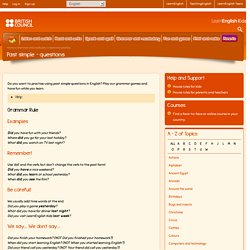
Where did you go for your last holiday? Adjective Order - English Grammar Lesson. Reported speech questions 1. Past simple – irregular verbs. Articles - "a, an, the" Snakes and Ladders Game. ESL Interactive Fun Games Here we have the games carefully laid out for you.

Follow the links to browse the variety of games offered. This is only the directory for interactive games and exercises. Our ESL fun games here include : Snakes and Ladders, Hangman, Spelling games, Wheel of Fortune, TV Games(Betting Game), Mazes, Memory Games, Matching exercises, Sequencing exercises, Picture Quizzes, Catch it and more. These games provide the ultimate fun in practising the following skills: Grammar Games & Interactive Exercises - Click Here! Grammar: present perfect simple. The definite article. We use the, the definite article, before a singular or plural noun.

We use the to show people that they know (or they will soon know) what we are talking about. Can you explain with examples? Of course. The definite article, the, can refer backwards in a conversation or text to something already mentioned. … my sister there hid a little parcel in my suitcase, so when I was unpacking the case I had a really cool surprise ... It can also refer forwards to something which is going to be mentioned or explained. Could you bring me the knife which you gave me? Does the always refer backwards or forwards? No, it can also refer to shared knowledge or general knowledge. But I'll try to connect from the hotel every evening. OK, I understand those rules, but I’ve seen lists of different uses of the.
Present Continuous (in Polish) Gs comparatives and superlatives exercises. Mowa zależna/reported speech. Countable and uncountable nouns. Some nouns in English are countable – we can use them in singular and plural forms.
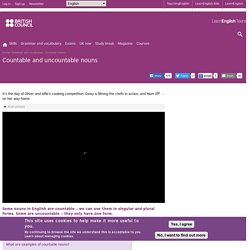
Some are uncountable – they only have one form. We often use a/an with singular countable nouns and some with plurals. We can also use some with uncountable nouns. What are examples of countable nouns? Here are a few: I've got a steak, some red chilli peppers, some potatoes… OK, well, I've got a lemon, an apple … and some chicken breasts. OK, so for things you can count, like one pen, two pens … Why did you say a pen, not one pen? We often use a/an before singular countable nouns. So is one wrong? It sounds as if you're saying one (not two). But someone who works in a café might say, So that's one coffee and two lemonades. Index. Articles 1. Defining relative clauses - zd. przydawkowe definiujące.
Causative Verbs Practice Exercise. 1.
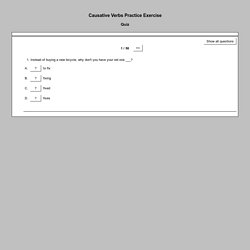
Instead of buying a new bicycle, why don't you have your old one ___? To fix fixing fixed fixes2. Can you help me ___ my livingroom next weekend? To paint painting painted paint3. My mom always makes me __ my room on Saturday mornings. to clean up cleaning up cleaned up clean up4. Make or do exercises - confusing verbs in English. Present Simple. Stative verbs. Stative verbs Some verbs are not usually used in the continuous form, even when we are talking about temporary situations or states. These are called stative verbs. So, we say I’m sorry, I don’t understand rather than I’m not understanding. Past Simple (in Polish) Verbs followed by ‘ing’ or by ‘to + infinitive’ 1. Verbs followed by ‘ing’ or by ‘to + infinitive’ 2. Passive forms.
We use the passive, rather than the active, to show that we are more interested in a certain part of the sentence. The passive is usually formed by the verb to be + past participle. Can you give me some examples of the active and passive? Yes, of course. Here’s a passive sentence: My room is being cleaned. 'My room' is the main focus of the sentence. ESL Grammar - Active vs. Passive Voice. Reported Speech. Indirect questions. Future forms. We have different ways of talking about the future.
We often use going to (+ infinitive), the present continuous (to be + -ing) or will (+ infinitive). The structure we use depends on the function of what we want to say, whether we are talking about arrangements, plans, predictions, etc.. I thought will was the future tense in English. It’s one of the ways of talking about the future, but there are a few others. Let’s look at will to start with. Oliver’ll be back soon. Reported speech questions. Who, whom. Whom is the object form of who. We use whom to refer to people in formal styles or in writing, when the person is the object of the verb.
We don’t use it very often and we use it more commonly in writing than in speaking.